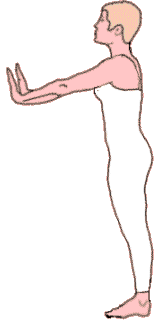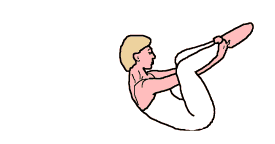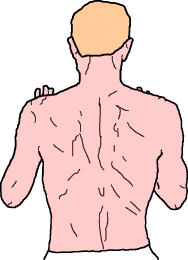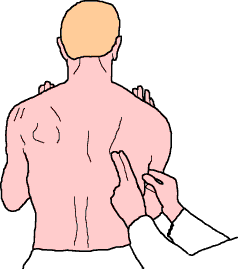|
|
|---|
(1) Learning Pilates from other than a real live instructor is not easy,
and does carry some slight risks. You should (in addition to these notes)
attend a course of certified Pilates mat sessions.
This is the safest way to learn, and it's also a lot of fun!
(2) Please ensure that you are competent in "Pilates Contrology".
(free pdf e-book).
Setup for Wall Push Ups:
- Stand in Pilates stance with your toes two foot lengths away from the wall, and place your
hands on the wall, with fingers directly in front of your shoulders.
- Scoop your abs; clench your buttocks and inner thighs.
- Lengthen tall, and keep your elbows close in to your body.
- Roll the points of your shoulders back and your shoulder blades downward.
Action for Wall Push Ups.
-
Inhale and lower to the wall, keeping your elbows close to your body.
- Hold. Points of your shoulders back, shoulder blades down!
- Exhale to push the wall away from you.
Classic Pilates Cueing:
- Roll your shoulder blades away from your ears.
- Elbows close!
(Classical Pilates Exercises: Bodyweight Wall Push Ups, Scroll right>>>...)
|
Classical Pilates for Beginners:
Wall Push Ups

Level: Beginner, Repetitions: 8-10
|
Previous Exercise:
The Seal

(In Classical Pilates Exercise, The Seal Preceeds Wall Push Ups).
|
|
Next Exercise:
Stretches.
|
Classical Pilates Exercises Online: Bodyweight Wall Push Ups, © Bruce Thomson, EasyVigour Project
|
|
Purposes:
-
Works the triceps, gently stretches the pectorals.
- Activates the shoulder stabilizers (Serratus anterior, lower trapezius, infraspinatus).
- By promoting a stable shoulder, shoulder impingement pain is reduced
Precision Points:
- Lengthen tall, inhale and exhale fully.
- Relax and lengthen your shoulders out to the side, and roll your shoulder blades down
("activate your upper powerhouse" - diag. left).
- Use a friend to check that your latissimus dorsi is relaxed, and that your shoulder
blades do not lift away from your ribs (right hand diagram).

 Modifications:
Don't let pain or weakness stop you!
There is always a modification. Take your time and find the right one for you.
If in doubt, seek advice!
Modifications:
Don't let pain or weakness stop you!
There is always a modification. Take your time and find the right one for you.
If in doubt, seek advice!
- Shoulder pain - "Lower" half way to the wall (this is a good exercise for shoulder pain).
- Neck pain - keep your neck long and relaxed.
|
|



